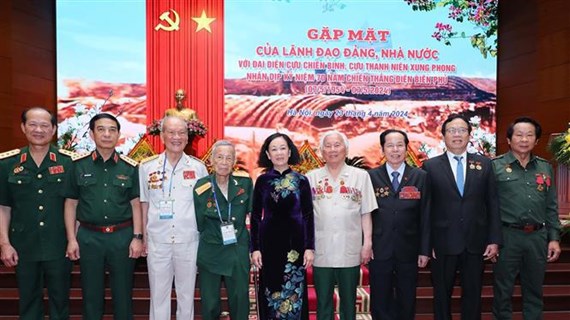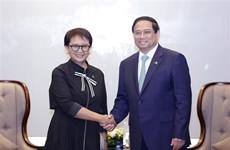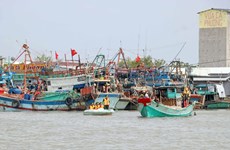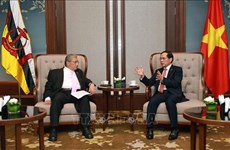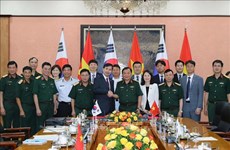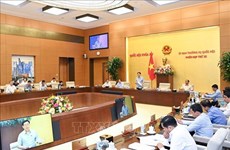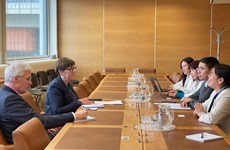ASEAN steps up external relations
ASEAN has always placed importance on improving relations with its
partners, to gain their support for the common goals of peace, security
and sustainable development, along with exerting efforts to boost
internal cooperation and connectivity and build its own community.
Pham Quang Vinh, Assistant to the Vietnamese Foreign Minister made this affirmation in an article featuring the prioritised goals of the group in 2010, when Vietnam held the position of ASEAN Chair.
Pham Quang Vinh, Assistant to the Vietnamese Foreign Minister made this affirmation in an article featuring the prioritised goals of the group in 2010, when Vietnam held the position of ASEAN Chair.
ASEAN has always placed importance on improving relations with its
partners, to gain their support for the common goals of peace, security
and sustainable development, along with exerting efforts to boost
internal cooperation and connectivity and build its own community.
Pham Quang Vinh, Assistant to the Vietnamese Foreign Minister made this affirmation in an article featuring the prioritised goals of the group in 2010, when Vietnam held the position of ASEAN Chair.
Operating under the theme of, “Toward an ASEAN Community: from vision to action”, ASEAN undertook a hectic round of external activities in 2010, with 14 high-level meetings and eight ASEAN + 1 summits held in October alone.
Through these meetings, ASEAN’s cooperation with its partners developed significantly and was broadened and deepened in all spheres and at various cooperative frameworks, Vinh said.
“ASEAN’s relations with each partner have been elevated to a new height and more practically, bring a strategic partnership or comprehensive ties,” Vinh noted.
He emphasised that the group’s cooperation with its partners at such forums as ASEAN+3 and East Asia Summit (EAS) continued to grow in a dynamic and more practical manner, helping promote dialogue and mutual cooperation, especially in dealing effectively with challenges, including economically sustainable development and recovery, climate change, natural disasters, epidemics, and trans-national crime.
The ASEAN+3 cooperation has thrived in 22 areas under nearly 60 different mechanisms, with the most noteworthy being a multilateral agreement on the 120 billion USD Chiang Mai initiative on currency convertibility, to support efforts to respond to threats of a regional financial crisis, the Vietnamese diplomat said.
Vinh noted that ASEAN and its partners had agreed to carry out feasibility studies on initiatives relating to the East Asia Free Trade Area (EAFTA) and the Comprehensive Economic Partnership for East Asia (CEPEA) to move towards building a free trade area (FTA) in East Asia .
Regarding the consolidation of a peaceful, secure and stable environment in the region, the Vietnamese official highlighted ASEAN’s active use of tools and cooperative mechanisms, including the ASEAN Treaty for Amity and Cooperation (TAC), the Southeast Asian Non-nuclear Weapon Free Zone (SEANWFZ), the Declaration on Conduct of Parties on the East Sea (DOC), and the ASEAN Regional Forum (ARF), to boost dialogue and strengthen trust.
He drew attention to Canada and Turkey joining TAC during the year and ASEAN’s decision to broaden EAS to include Russia and the US from 2011.
ASEAN has increasingly promoted its role and made important and responsible contributions to the international community’s common affairs, especially at different regional and international forums like G20, APEC, ASEM, the UN, and the world conference on climate change, and has gained support and collaboration from its partners for its sub-regional cooperative programmes, particularly in the Sub-Mekong region, Vinh wrote.
Highlighting the group’s prominent and active role in implementing common goals, dealing with challenges and forming a future regional architecture, Vinh also underscored the role of Vietnam in the capacity as ASEAN Chair in 2010.
He highlighted Vietnam ’s demonstration of a “pro-active, enthusiastic and responsible” spirit in managing ASEAN’s operation.
Since the beginning of the year, Vietnam had defined the group’s prioritised goals, namely speeding up the roadmap of building the ASEAN Community and carrying out the ASEAN Charter, boosting ASEAN’s ties with partners, promoting cooperation for peace, security, and sustainable development to deal effectively with global challenges, and enhancing internal unity and heightening the group’s prestige to ensure its central role in the region. These goals received a high degree of consensus from other member countries in the group.
Concluding his article, Vinh quoted Deputy Prime Minister and Foreign Minister Pham Gia Khiem as saying, “The successful ASEAN Chair role in 2010 marked a new and significant development step for Vietnam in its regional and international integration course”.
“ Vietnam ’s efforts and active contributions to ASEAN’s development and strength have once again asserted the country’s consistent policy of treasuring ASEAN in multilateral and bilateral cooperation and demonstrated its efforts to work to its utmost for a strong and united ASEAN with increasingly close connectivity.”/.
Pham Quang Vinh, Assistant to the Vietnamese Foreign Minister made this affirmation in an article featuring the prioritised goals of the group in 2010, when Vietnam held the position of ASEAN Chair.
Operating under the theme of, “Toward an ASEAN Community: from vision to action”, ASEAN undertook a hectic round of external activities in 2010, with 14 high-level meetings and eight ASEAN + 1 summits held in October alone.
Through these meetings, ASEAN’s cooperation with its partners developed significantly and was broadened and deepened in all spheres and at various cooperative frameworks, Vinh said.
“ASEAN’s relations with each partner have been elevated to a new height and more practically, bring a strategic partnership or comprehensive ties,” Vinh noted.
He emphasised that the group’s cooperation with its partners at such forums as ASEAN+3 and East Asia Summit (EAS) continued to grow in a dynamic and more practical manner, helping promote dialogue and mutual cooperation, especially in dealing effectively with challenges, including economically sustainable development and recovery, climate change, natural disasters, epidemics, and trans-national crime.
The ASEAN+3 cooperation has thrived in 22 areas under nearly 60 different mechanisms, with the most noteworthy being a multilateral agreement on the 120 billion USD Chiang Mai initiative on currency convertibility, to support efforts to respond to threats of a regional financial crisis, the Vietnamese diplomat said.
Vinh noted that ASEAN and its partners had agreed to carry out feasibility studies on initiatives relating to the East Asia Free Trade Area (EAFTA) and the Comprehensive Economic Partnership for East Asia (CEPEA) to move towards building a free trade area (FTA) in East Asia .
Regarding the consolidation of a peaceful, secure and stable environment in the region, the Vietnamese official highlighted ASEAN’s active use of tools and cooperative mechanisms, including the ASEAN Treaty for Amity and Cooperation (TAC), the Southeast Asian Non-nuclear Weapon Free Zone (SEANWFZ), the Declaration on Conduct of Parties on the East Sea (DOC), and the ASEAN Regional Forum (ARF), to boost dialogue and strengthen trust.
He drew attention to Canada and Turkey joining TAC during the year and ASEAN’s decision to broaden EAS to include Russia and the US from 2011.
ASEAN has increasingly promoted its role and made important and responsible contributions to the international community’s common affairs, especially at different regional and international forums like G20, APEC, ASEM, the UN, and the world conference on climate change, and has gained support and collaboration from its partners for its sub-regional cooperative programmes, particularly in the Sub-Mekong region, Vinh wrote.
Highlighting the group’s prominent and active role in implementing common goals, dealing with challenges and forming a future regional architecture, Vinh also underscored the role of Vietnam in the capacity as ASEAN Chair in 2010.
He highlighted Vietnam ’s demonstration of a “pro-active, enthusiastic and responsible” spirit in managing ASEAN’s operation.
Since the beginning of the year, Vietnam had defined the group’s prioritised goals, namely speeding up the roadmap of building the ASEAN Community and carrying out the ASEAN Charter, boosting ASEAN’s ties with partners, promoting cooperation for peace, security, and sustainable development to deal effectively with global challenges, and enhancing internal unity and heightening the group’s prestige to ensure its central role in the region. These goals received a high degree of consensus from other member countries in the group.
Concluding his article, Vinh quoted Deputy Prime Minister and Foreign Minister Pham Gia Khiem as saying, “The successful ASEAN Chair role in 2010 marked a new and significant development step for Vietnam in its regional and international integration course”.
“ Vietnam ’s efforts and active contributions to ASEAN’s development and strength have once again asserted the country’s consistent policy of treasuring ASEAN in multilateral and bilateral cooperation and demonstrated its efforts to work to its utmost for a strong and united ASEAN with increasingly close connectivity.”/.





